BRICS Democracies Are Losing Leverage
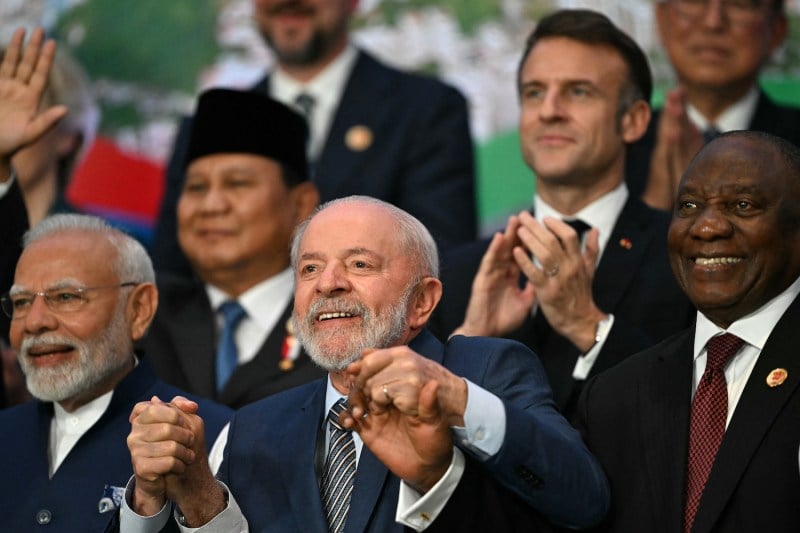
BRICS Democracies Are Losing Leverage
To increase their bargaining power, Brazil, India, and South Africa should resurrect a dormant diplomatic forum.
Indian Prime Minister Narendra Modi, Brazilian President Luiz Inácio Lula da Silva, and South African President Cyril Ramaphosa pose for a group photo at a G-20 meeting in Rio de Janeiro on Nov. 19, 2024. PIMENTEL/AFP via Getty Images
In 2003, India, Brazil, and South Africa established what they called the IBSA Dialogue Forum. The trilateral initiative aimed to promote south-south cooperation, reform global governance structures, and amplify the three democracies’ voices on the international stage. In the years that followed, the leaders of IBSA countries organized regular summits to facilitate collaboration across various sectors.
However, as the BRICS bloc—which initially included Brazil, Russia, India, and China—gained prominence and added South Africa as a member in 2010, IBSA’s activities waned. Though IBSA foreign ministers still organize a yearly meeting on the sidelines of the United Nations General Assembly, where they regularly call for U.N. Security Council reform, the group’s relevance has plummeted.
In 2003, India, Brazil, and South Africa established what they called the IBSA Dialogue Forum. The trilateral initiative aimed to promote south-south cooperation, reform global governance structures, and amplify the three democracies’ voices on the international stage. In the years that followed, the leaders of IBSA countries organized regular summits to facilitate collaboration across various sectors.
However, as the BRICS bloc—which initially included Brazil, Russia, India, and China—gained prominence and added South Africa as a member in 2010, IBSA’s activities waned. Though IBSA foreign ministers still organize a yearly meeting on the sidelines of the United Nations General Assembly, where they regularly call for U.N. Security Council reform, the group’s relevance has plummeted.
Today, there is a compelling case for revitalizing IBSA after more than a decade of dormancy. There are three reasons why a relaunch would benefit member countries and add a crucial new element to the global order.
First, BRICS has changed fundamentally over the last three years. There are tensions within the group over Russia’s full-scale invasion of Ukraine in 2022. BRICS also expanded its membership last year. Taken together, these factors risk reducing the group’s agility and ability to address global challenges. They might even strengthen member states that aim to transform BRICS into a Chinese-led bloc that antagonizes the West. IBSA countries, by contrast, have always favored multialignment and are seeing their space within BRICS shrink.
Second, amid the geopolitical uncertainty caused by U.S. President Donald Trump’s return to the White House—not all of which is bad news for IBSA countries—it is crucial that India, Brazil, and South Africa deepen their ties beyond the major poles of power.
And third, IBSA countries offer a uniquely valuable perspective in the debate about how to address the major challenges faced by developing democracies around the world. Though India, Brazil, and South Africa are all highly visible on the global stage, their capacity to set the global agenda would increase markedly if they spoke with one voice on specific issues.
From the start, IBSA’s goal was to strengthen emerging powers in the global south. The forum was established following negotiations between Indian Prime Minister Atal Bihari Vajpayee, Brazilian President Luiz Inácio Lula da Silva, and South African President Thabo Mbeki during the 2003 G-8 summit in Évian, France. The three leaders were invited to the summit as observers, yet they felt that the invitation was largely symbolic.
“What is the use of being invited for dessert at the banquet of the powerful?” Lula later quipped. “We do not want to participate only to eat the dessert; we want to eat the main course, dessert and then coffee.”
The forum established trilateral working groups focused on areas such as agriculture, environment, defense, and energy, while regular ministerial meetings and presidential summits reinforced the countries’ collaboration. As global power dynamics shifted from a U.S.-led order toward multipolarity, IBSA highlighted the growing influence of emerging powers and the limitations of international institutions in reflecting those countries’ rise.
For example, in its first declaration in 2003, the group called for reorganization of the Security Council to include new permanent members from developing countries. Indian Prime Minister Manmohan Singh, who took office in 2004, described the grouping as a “strong moral force in today’s unsettled world.”
Even before IBSA’s creation, India, Brazil, and South Africa had collaborated to address the restrictive aspects of the World Trade Organization’s TRIPS agreement on intellectual property rights. Their efforts led to the 2003 TRIPS waiver, which allowed developing nations to export generic medicines during public health emergencies.
Their efforts, including leadership in the G-21 coalition, a bloc of developing countries, significantly improved access to affordable drugs for HIV and AIDS around the world—particularly in Africa—by enabling local production without the consent of patent holders. The debate around the TRIPS waiver became important again during the COVID-19 pandemic.
Based on a sense that international economic and financial architecture did not serve the interests of developing nations, IBSA countries found success in deepening their limited bilateral relations and establishing a jointly financed—though very small—IBSA fund, in addition to joint naval exercises in a format called IBSAMAR.
Furthermore, the three middle powers created coordinated strategies to enhance their influence within multilateral institutions such as the U.N., World Bank, and International Monetary Fund. They made efforts to align their strategies within the U.N. Human Rights Council, reaffirmed their commitment to universal human rights, and made joint statements on international conflicts, including recently on Gaza and Ukraine.
Yet the initial excitement and flurry largely fizzled out around 2013, when a leaders summit scheduled to take place in New Delhi to commemorate IBSA’s 10th anniversary was canceled. That decision was in large part due to Brazilian President Dilma Rousseff’s focus on domestic politics, aggravated by a wave of large-scale protests in Brazil in June of that year. Lula, her predecessor, had a more activist international posture.
But the more important factor in making IBSA irrelevant was likely South Africa’s accession to BRICS in 2010—an effort that was led by China. It was probably in Beijing’s interest to sideline a global south platform that it was not part of. So while IBSA preceded BRICS and while Singh famously expressed his preference for IBSA over BRICS—“IBSA has a personality of its own. It is three separate continents, three democracies,” he said—it ended up being BRICS that turned into the most relevant geopolitical platform in the global south.
Today’s profoundly changed geopolitical landscape has created an opportunity for IBSA to resurrect itself.
Though BRICS remains relevant for the foreign-policy strategies of Brazil, India, and South Africa, the grouping has become unwieldy—and its utility is now more limited than it used to be. The war in Ukraine and Russia’s deteriorating ties to the West have created growing tensions between the anti-Western faction in BRICS, led by Russia and China, and a more moderate group committed to preserving ties to the West, led by India and Brazil.
The bloc’s membership expansion in 2024 changed its power distribution. Russia and China pushed for expansion, eventually adding Egypt, Ethiopia, Iran, the United Arab Emirates, and later Indonesia, as full members. A host of so-called partner countries can now also participate in numerous BRICS activities. Reaching consensus among this expanded group is significantly more difficult—as evidenced by the bloc’s failure, for the first time, to develop a joint statement at a foreign ministers meeting in April. Egypt and Ethiopia reportedly objected to including language in favor of Security Council reform, which Brazil, India, and South Africa have long sought.
In some areas, IBSA’s interests diverge significantly from the other established BRICS members. Though Russia, for example, is keen to advance alternatives to the U.S. dollar to circumvent Western sanctions, policymakers in IBSA countries are less interested in moving ahead with the issue, a reluctance potentially aggravated by Trump’s recent threats of punitive tariffs against any country that joins such an initiative.
What’s more, when BRICS was created, China was an emerging power—yet it is now largely seen as a great power. That complicates the bloc’s capacity to speak on behalf of the global south.
Reviving IBSA would provide a forum to push for countries’ shared goals without getting bogged down in increasingly complicated BRICS negotiations. In a world where crafting agreements in large multilateral settings has become difficult, adding a minilateral group such as IBSA to the mix could lead to meaningful cooperation in many areas, such as conflict resolution, the climate crisis, and maritime security.
As China and Russia try to push BRICS into a more anti-Western position, IBSA would allow member countries to articulate a multialigned strategy and preserve strong ties to the West. India has recently moved closer to the United States and is heavily invested in the Quadrilateral Security Dialogue; that is more than New Delhi has done operationally with BRICS. Brazil hopes to see the European Union ratify a historic trade deal with Mercosur—a South American trade bloc—has deepened cooperation with the Organization for Economic Cooperation and Development, and was designated by Washington in 2019 as a “major non-NATO ally.”
A separate space would also let IBSA governments reinforce their quest for specific reform proposals—including at the Security Council—that other BRICS members are either indifferent about or actively opposed to. At the same time, reviving IBSA does not imply that Brazil, India, and South Africa would move away from BRICS. IBSA would simply be an additional tool.
When IBSA leaders got together for their last official summit in October 2011, being friends with all major global players was easier to achieve than it is today. Russia had not yet annexed Crimea and U.S.-China ties were far rosier than they are now. In the years since, the world has become more unstable, making strategic diversification paramount. Trump’s return to the White House adds a layer of unpredictability. But India and Brazil could, for example, play a supportive role for South Africa as its ties to the United States deteriorate under Trump.
The growing divergence between China and the West offers a unique opportunity for IBSA countries to jointly develop strategies to amplify their ties to Europe and the United States in ways that the BRICS bloc cannot.
Finally, while IBSA’s three democracies represented a majority of BRICS members prior to expansion, democracies are now a minority in the bloc. Establishing a separate space for IBSA would allow India, Brazil, and South Africa to identify common denominators and advance issues that are difficult to discuss in the context of BRICS—including political polarization, disinformation, and internet governance.
One example of shrinking space for democracies within BRICS is the decreasing relevance of the BRICS Academic Forum, which used to be intellectually vibrant but now provides very limited space to discuss sensitive issues or openly disagree with member states’ policies. In short, it has largely ceased to be a platform of genuine debate. A comparable structure for scholars from IBSA countries would provide a far freer environment for genuine deliberation.
Oliver Stuenkel is an associate professor of international relations at the Getulio Vargas Foundation in São Paulo and a visiting scholar at the Carnegie Endowment for International Peace in Washington, D.C. X: @OliverStuenkel
More from Foreign Policy
-

This handout picture provided by the office of Iranian Supreme Leader Ayatollah Ali Khamenei shows him praying inside the tomb of the late Supreme Leader Ayatollah Ruhollah Khomeini in Tehran on Jan. 30. Why Khamenei Is Betting on Trump
The calculus behind Iran’s stunning reversal on a new nuclear deal.
-

Musk wears a red had that reads “GULF OF AMERICA.” Elon Musk Was Donald Trump’s Useful Idiot
It’s looking increasingly likely that the world’s richest man got played.
-

With Jared Kushner to his left, Donald Trump listens to the rabbi Shmuel Rabinovitch during a visit to the Western Wall in Jerusalem’s Old City on May 22, 2017. Trump Isn’t Following the Script on Israel
In dealing with Netanyahu, the U.S. president appears to actually be living up to his campaign slogan to put America first.
-

Indian Air Force personnel stand in front of a Rafale fighter jet during a military aviation exhibition at the Yelahanka Air Force Station in Bengaluru. A Tale of Four Fighter Jets
The aircraft India and Pakistan use to strike each other tell a story of key geopolitical shifts.

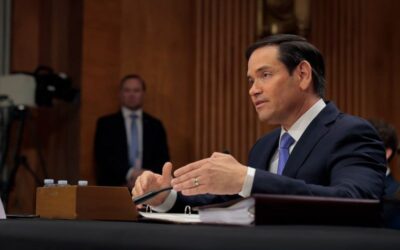


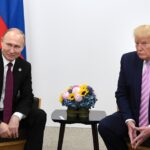


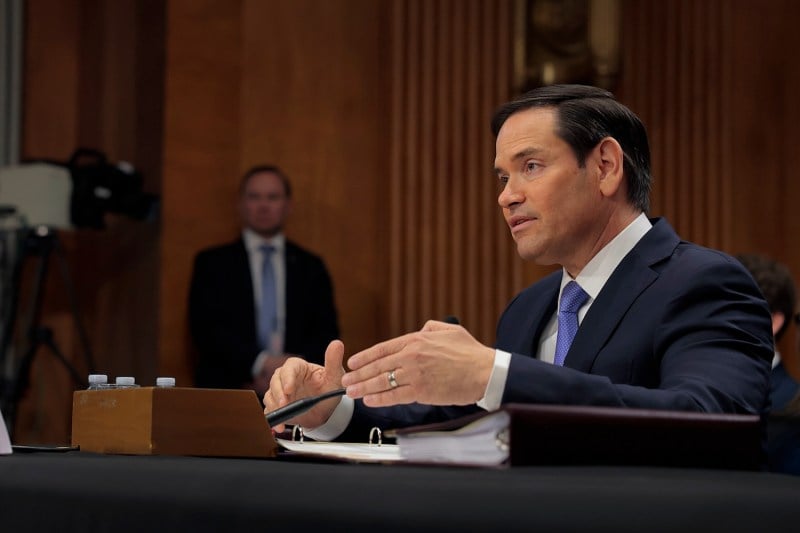
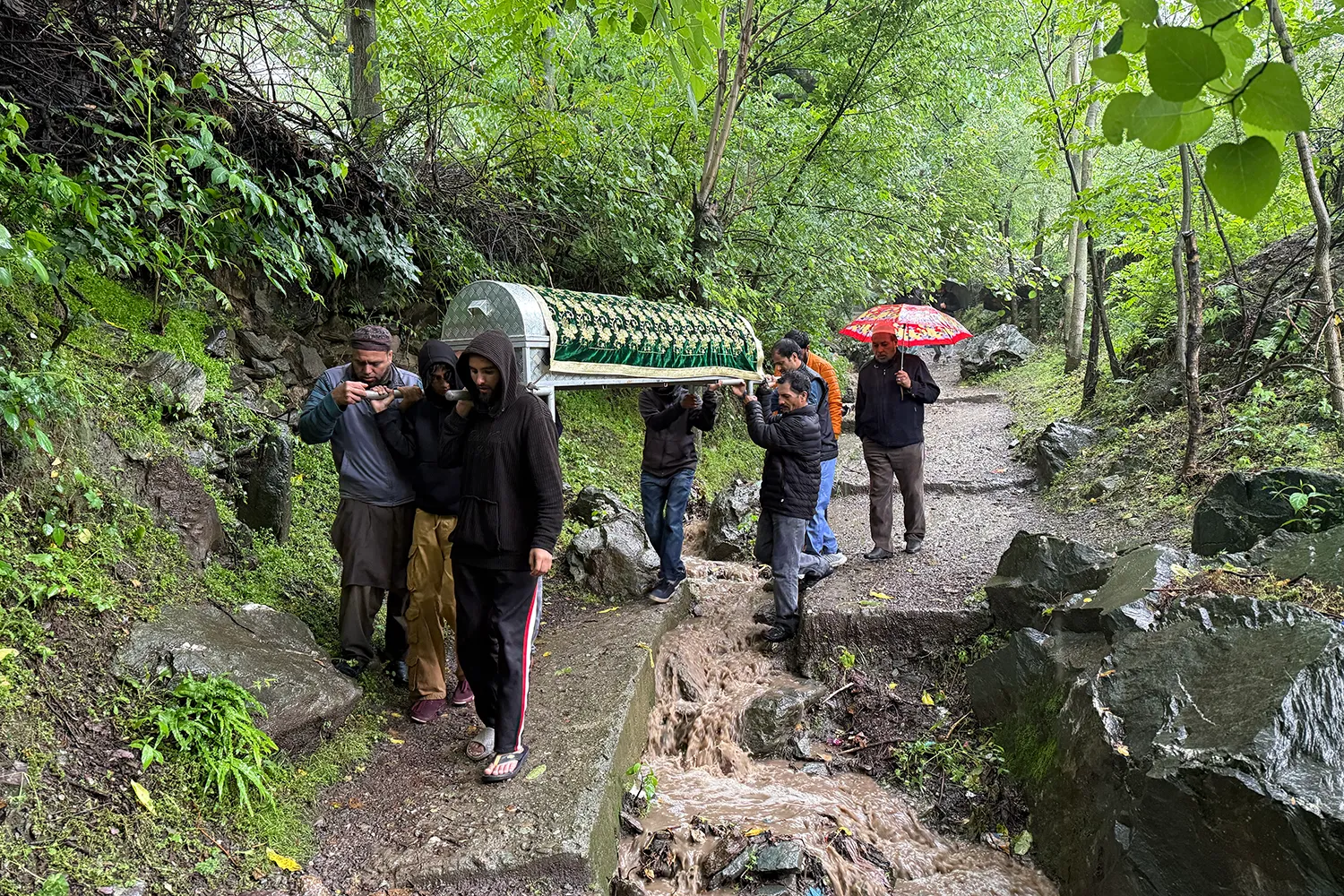
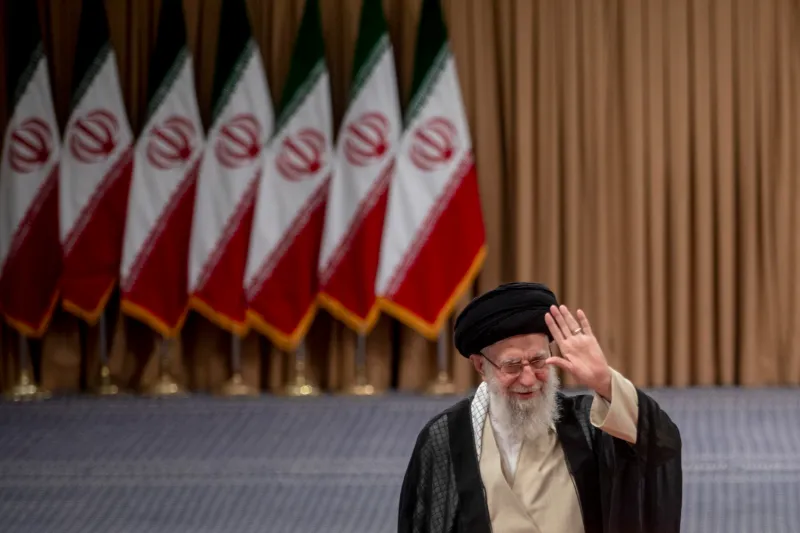

Join the Conversation
Commenting on this and other recent articles is just one benefit of a Foreign Policy subscription.
Already a subscriber?
.
Subscribe
Subscribe
View Comments
Join the Conversation
Join the conversation on this and other recent Foreign Policy articles when you subscribe now.
Subscribe
Subscribe
Not your account?
View Comments
Join the Conversation
Please follow our comment guidelines, stay on topic, and be civil, courteous, and respectful of others’ beliefs.
Change your username |
Log out
Change your username:
CANCEL
Confirm your username to get started.
The default username below has been generated using the first name and last initial on your FP subscriber account. Usernames may be updated at any time and must not contain inappropriate or offensive language.